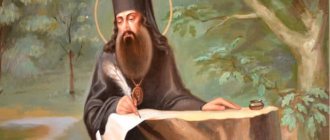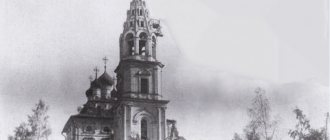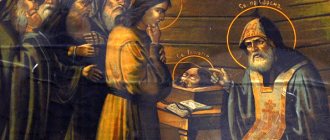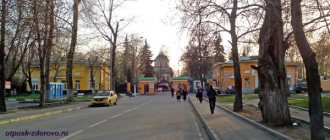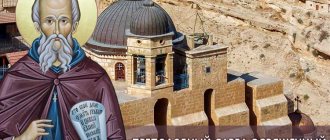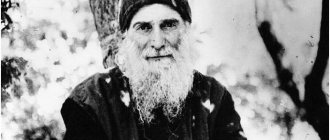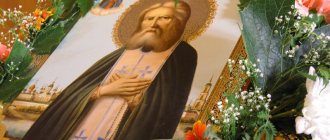Venerable Gennady Kostroma - life
The parents of the Monk Gennady were boyars. They professed the faith of Christ, but did not have any special zeal for the salvation of their souls, but their son from childhood clung to the Church with all his heart and unforgettably visited the temple during divine services. His mother and father reproached him for this, saying: “Why are you doing this? After all, you are not a church watchman, we are ashamed in front of people.” But Gennady answered them: “Dear parents, do not bother me with such speeches. God does what he wants, and man does what he can; the Holy Spirit guides every person on the true path.”
Finally, he left his father’s house with the intention of entering a monastery and wandered for some time, suffering many troubles and misfortunes from evil people, until he came to the hermitage of St. Alexander of Svirsky. He blessed him and said: “You yourself will one day be a mentor to monks, now go to the Komel forest to Saint Cornelius, he will teach you prayer and make you a real monk.”
Gennady obeyed the Monk Alexander and took monastic vows at the monastery of Cornelius of Komel. He labored diligently in prayer and labor: he worked in a cookery, a bakery, and other difficult obediences. He treated everyone with love, but some monks, out of envy, grumbled at Gennady and insulted him. Hearing this, the Monk Cornelius said to him: “Child Gennady, do not grieve the brethren about this, for they act this way according to the inspiration of the demons.” And Gennady bravely endured all the unfair insults.
Finally, with the blessing of Saint Cornelius, he went into the Kostroma forests, to Lake Surskoe, and became the abbot of a new monastery. Through the prayers of the reverend fathers and with the help of Grand Duke Vasily Ioannovich, the monastery was quickly improved, two churches and cells for monks were erected in it. Many brethren flocked to the monastery. The Monk Gennady set an example of patience and humility for everyone; he himself worked more than others: he made candles, chopped and carried firewood, baked prosphora and bread, and did laundry. He never missed a church service and ate and slept very little. And with all these labors and worries, the Monk Gennady incessantly prayed to God with his heart.
God's grace rested on him, and he acquired the gift of miracles and prophecy. He healed Bishop Cyprian from a serious illness through prayer. Once, blessing one noblewoman Anastasia Romanovna, the monk said: “You, a beautiful vine and a fruitful branch, will be our blessed empress.” And indeed, Anastasia Romanovna married Grand Duke Ivan Vasilyevich, who later became king. The Monk Gennady performed many other miracles during his life and after death. His relics were preserved incorrupt, and his soul entered the Heavenly Abodes of our Lord Jesus Christ. Amen.
Spiritual reading >>
Veneration and days of remembrance
After his death, the relics of Gennady were buried in the same place where the body of St. Alexis lay before its discovery. In the winter of 2016, at the Council of Bishops, he was canonized by unanimous decision. The saint is commemorated on February 10, as well as on August 26 during the Council of Moscow Saints.
Troparion to Saint Gennady
You became like the ancient father, / Saint Father Gennady, / having collected the Holy Books and putting to shame the heretics, / showing zeal for God, protecting your flock, / pray now to Christ God / to grant peace to the Church / and save our souls.
Kontakion to Saint Gennady
Grant me the word, O All-Powerful Savior, to glorify Your wondrous saint, who has fought a good fight and is now brightly adorned with a crown of victory.
The horsemen, and the three hundred, and all the army of the thought of Pharaoh took up arms against the Bride of Christ, persecuting, comprehending and dividing the property of the Lord, like self-interest, both by your word, Saint Gennady, you covered them with the abyss, drowning them in the depths like a stone.
By you, saint, as by your right hand, you, the Lord, have erased those who opposed you, but you are now glorified in the fortress, and in the glory of heavenly rejoicing, and those in existence You despise them on earth.
Theotokos: Having You, Devo, a quick Intercessor and a refuge for the weak, let us not be afraid of the evil one, let us escape the wicked vacillations, and accept the heavenly treasures with all our hearts we hope.
Song 3
Irmos: The bow of the strong is weak, and the weak are girded with strength, for this reason my heart may be established in the Lord.
The mark of wickedness has become stronger at the thrones of the churches and in the palaces of the kings, and in your pride the high and blasphemous verb, you, the saint, have established with your word You give hope in the Lord to the faithful.
The bow of the evil one is exhausted, and the body of the flattering one is exhausted in the end, but by the power of the Lord His girdle against the enemy, He will give you the prayer of prayer, like the fire of resistance. scorching, and bless the flight of His righteous saint.
You, Father Gennady, who descended from heaven and ascended, preached, Who is to judge with the end of the earth in truth, even if the hour of His coming is unknown, even and you count the flight of the eighth thousandth Paschal, O saint, so that the service of truth may not cease until the coming of Christ.
Theotokos: Let us resolve our spiritual infertility, O Virgin, and drive away the darkness of ignorance from the hearts of those overwhelmed by passions, so that we may bear the undecaying fruit of piety.
[Ying] kontakion, voice 2
Having shown great correction for the good of the Church, the Orthodox faith [thou hast affirmed, Saint Father Gennady, do not cease to pray for us, in the Kingdom of Heaven enjoying the Immortal meal].
Sedalen, voice 4
In the weakness of humanity, the ruler who creeped and flattered the comma through the machinations, you valiantly reflected the insolence of the enemy, and you appeared to the king as a guide to salvation, Gennady is wise, and so Holy Russia was saved, strengthened by the scepter and rod of the bishop, and even now we pray for us, the saint, forsaking us is sinful ́въ grant, and now free your people from the torment of the bitter from the lawless rulers.
Glory, seat of the martyr. And now, the Mother of God is his.
Song 4
Irmos: For the sake of Love, Generous One, You became Your image on Your Cross, and the nations melted away, For You are, O Lover of Mankind, my strength and praise.
From the south who came and from the Holy Virgin the incarnate God you confessed before the faithful and the unbelieving, both strengtheningly and with the sword the words of God cutting as if to the death of the fallen and those who are sick and incurable.
On the Divine watch over the flock of Christ's sheep you became, until you saw the shame of the wicked, the saint, looking down on your flock, bringing strength in battle To your God be praise.
Ole wickedness of the wicked! It is manifestly pious, but secretly Judaizing, reproaching every holy thing of the church with abuse, the servants having become a demon, but like wax from the face of fire, your words, father, are I'm melting.
Theotokos: Hasten to the aid of those who are fierce and immersed in misfortunes, O Pure Mother of the Lord, bring down the wicked vacillations, while singing in Thy intercession.
Song 5
Irmos: Thy Enlightenment, Lord, send down upon us and resolve us from the darkness of sins, O Blessed One, grant Thy peace.
From the night of the morning, your spirit to the Lord about faith was mocked by fierce blasphemy, and even the entire set of Divine Scriptures was copied by you, God-wise, and also by all Rus. I am enlightened and sing thanks to you.
With the dew of your words, you give healing to those who are ill with heresy and the mind of those who have been waiting, O saint, but the land of the wicked has fallen, those who do not confess the Triscendent God-First Light and from residing incarnations of the Only Begotten.
Truly, more than the resurrection of the dead, there is a greater and more glorious miracle, even if the dead evildoer is blasphemous, then proceed to piety and turn to praise I pray for you, Father, who created the most glorious and joyful things on earth.
Theotokos: No one will see the Light, sweep away the icons of Your worship, but do not give honor to the image, as from the prototype of the brightness of the light the reception will be possible.
Song 6
Irmos: I came into the depths of the sea and drowned me, there is a storm of many sins: but like God from the depths, raise up my life, O Many-Merciful One.
The depth of malice and the abyss of blasphemy have swallowed up the Russian Church; you cried out to the Lord with all your heart, and you were heard from all hope Well, even now we resort to your prayer.
Thou hast descended in thy understanding to the very abyss of the secret undertakings of the enemy, so that thou mayest bring up lost souls from decay. Ole fury of the godless!
Preserving the vain and false spirit of the Merciful and Righteous Lord, and having armed yourself with all the malice of the flattering tongue to honor Him, you, the saint, in the voice of praise and confession The gift of the true sacrifice is devouring, the machinations of those you have brought down to the end.
Theotokos: Do not turn Your face away from us, O Lady, but look mercifully on the warmth of Your people, even though we fall in multitudes of fierce sins, but Your mercy is present but we also seek You, as we warmly glorify the Mother of God and Intercessor.
Kontakion, tone 4
As the gentle, meek mentor and deceitful accuser of the bold, the Church honors you, Saint Gennady, so we cry to you with love: yes to us simplicity Restore the spirit and tenderness and in confessing the right keep our souls intact.
Ikos
O righteousness of God come, O seeker of heaven, let us rejoice in the memory of our representative the strong Gennady, and let us heed his punishment: I roar like lions cabbage heretics, looking for someone to devour, are first to the careless and lazy, and the secret and cold affairs of the unrepentant are conveniently released and allowed, to Let us also bind ourselves with the bonds of sin, and let us fall to the good shepherd, for may the Lord give us a laborious heart to seek heaven faithful and in the confession of the right, our souls are kept unharmed.
Song 7
Irmos: Abrahamsti sometimes in Babylon the youths asked for the fire of the cave, crying out in songs: Our father God, blessed art thou.
The seduction and fury of the Christ-killers in your days became like a furnace of fire, but now the sevenfold ignite your Church, hasten for our help, O saint, let us cry with you: our father God, blessed are you.
Like Daniel in the den of lions, in the midst of the apostate walking in secret, you stopped those mouths of the evil one, Father Gennady, who has now come forth to the light You sing to the uneven: Father of our God, blessed are you.
You turned the flame kindled by the madness and disobedience of man into the spiritual dew of Orthodoxy, and taught you to cry: Our Father God, blessed are you.
Theotokos: You, the Most Pure Lady, as the prophet of the ancients fulfilled the aspirations of the ancients, we sing in silent songs: truly you clothed God with flesh and He became man Who gave, blessed art thou.
Song 8
Irmos: Omnipotent Redeemer of all, in the midst of the flame of piety, He descended and watered you and taught you to sing: all things, bless, sing to the Lord.
Thus and as a robber who approached the incorruptible wealth of the mental piety of dogmas, with enraged prohibition you forbade the saint, and you taught the faithful to sing: all children La bless, sing to the Lord.
If the true Messiah has not come, you are still waiting for it, enemies and criminals, you will remain in your sins until the fire will send you away, unlighted, but we will not forbid to cry continually: bless all things, sing unto the Lord.
Trinitarian: Three-dimensional light is one: Beginning and Guiltless, with the Pre-Eternally Begotten, and in a different way Coming and Life-giving to all creation.
Theotokos: Bring [our prayers to God], O Good One! Accept the prayer book and Thy saint Gennady, who moved by Thy love, teaches us to bless and sing to Thee forever.
Song 9
Irmos: Eve, through her illness, disobeyed the oath, instilled in her, but You, Virgin Mother of God, through the vegetation of the womb of the world, you have flourished with blessing. This is how we magnify you all.
Let us never die in our sins, the vows of Evina, the heir, but with faith and warmth and all kinds of zeal, Who from you, the saint, will accept the Preaching, and eat that Let us serve him as the Deliverer and Enlightener and Helper of strength, and the Giver of the righteous, possessing an abyss of generosity.
Be a warm representative for us, Gennady, protect your flock from the wolves that destroy it, and, moreover, nourish the blessed souls with the word of the Divine, so that we may magnify you all.
Trinity: Whoever believes in the One Godhead, who rejects the Trinity Godhood, not in the heavenly, but in the netherworlds of the earth of his father, has found himself, like not a single one create the creature, neither give birth, but I brought forth every lie from the womb, and gave my sonship to those who were pleased with untruth.
Theotokos: With the light of Your Son, enlighten our souls and our thoughts, O Good Lady, may we magnify You with a pure heart and lofty thought.
Luminous
Today, Great Novegrad, be enlightened, splash with spiritual songs in memory of your chairman Gennady in the joy of your saints, in whom is your praise and hardening.
The fight against the heresy of the Judaizers
The time of the priesthood in Novgorod of the holy Archbishop Gennady coincided with a formidable period in the history of the Russian Church - the spread of the heresy of the Judaizers. Jewish preachers, who came to Novgorod under the guise of traders, began sowing the tares of heresy and apostasy among the Orthodox since 1470. False teaching was spread secretly.
The first news of the heresy reached Saint Gennady in 1487: four members of a secret society, in a drunken stupor denouncing each other, discovered the existence of an ungodly heresy before the Orthodox. As soon as this became known to the saint, the zealous archpastor immediately began a search and with deep sorrow became convinced that the danger threatened not only local Novgorod piety, but also the capital itself, where the leaders of the Judaizers had moved back in 1480. In September 1487, he sent to Moscow, Metropolitan Gerontius, the entire search file in the original, along with a list of apostates he had discovered and their writings. The fight against the Judaizers became the main subject of the archpastoral activity of Saint Gennady.
The fight against heresy was carried out not on the basis of theological disputes and denunciations, but through administrative measures. Although St. Gennady was an educated man for his time, but his theological erudition was not outstanding [2]. He considered theological debates with heretics to be directly harmful and in his letter to the council of bishops he expressed the idea that a council on faith should not be allowed, since “our people are simple, they do not know how to speak from ordinary books: so that no speeches about faith should be made with them.” "
A council against heretics is needed, but not for a debate about faith, but in order to “execute them, burn them and hang them.” Gennady even tried to organize an exemplary auto-da-fé: when the council of 1490 sentenced some heretics to imprisonment and sent them to Novgorod, the saint ordered to meet them outside the city, dress them in birch bark helmets with the inscription “behold Satan’s army,” put them on horses facing the tail and in this form, drive through the streets, and then light their helmets.
However, all energetic measures against heretics recommended by St. Gennady, did not come true, since the heretics found support in Moscow and lived there quietly. Then St. Gennady turned to another measure - to a spiritual weapon.
Since among the clergy not only there were not enough trained people, but there were even few literate ones, St. Gennady petitioned Metropolitan Simon to establish schools. Measures to improve religious education among the clergy and people could not, of course, give quick results. To combat heresy, the saint turned for help to the abbot of the Volokolamsk monastery, Joseph of Volotsky, who became the most prominent fighter for Orthodoxy.
The saint invites the learned elders Paisius Yaroslavov and Nil Sorsky to his place - “to talk about those heresies”, searches the monasteries for books needed to fight heretics; It is curious that the Orthodox did not have many such books, not even the archbishop himself, but the heretics did have them.
"Gennadievskaya Bible"
The main task of Gennady, the compilation of the Slavic codex of biblical books, was partly connected with the same goal - to fight heresy with spiritual weapons. Until this very time, neither Russian writing nor the South Slavs had a biblical canon. Biblical books were copied in Rus', following the example of Byzantium, not in the form of a whole set, but in separate parts - the Pentateuch or Octateuch, Kingdoms, Proverbs and other teaching books; Psalms, Prophets, Gospels and Apostles. Biblical books, like any other, were offered to the ancient Russian reader in various collections, very diverse in content - together with and next to the works of the church fathers, lives, various teachings, often with apocryphal works or even directly with secular stories like “Alexandria”. It was too difficult for the literate masses to navigate among this literary chaos of collections, and this determines the significance of the work of St. Gennady. He was the first to isolate biblical books from the chaotic written mass of collections, collect them into one codex, and thereby lay the foundation for the Slavic Bible.
The sacred books of the Old Testament were especially often subject to accidental and intentional damage. Saint Gennady wrote about this with sorrow in a letter to Archbishop Joasaph: “They keep the Jewish heretical tradition - they distorted the psalms of David or the prophecies.”
. Having gathered around him scientists and biblical scholars, the saint collected all the books of the Holy Scriptures in a single set, blessed to translate again from Latin those of the Holy books that were not doomed to him in the handwritten tradition of the Slavic Bible, and in 1499 the first complete the body of Holy Scripture in the Slavic language - the “Gennady Bible”, as it is respectfully called by the name of its compiler, which has become an integral link in the continuity of the Slavic translation of the Word of God.
Work of St. Gennady composed an era in the history of the biblical Slavic canon and formed the basis of subsequent printed publications. The Code, however, was not even distinguished by the unity of the text in terms of language; some books were included there in the most ancient, perhaps even the original Cyril and Methodius translation, others in a significantly updated or even later text; some, finally - probably not at all found by Gennady in the Russian writing of that time - were translated on his instructions from Latin, from the Vulgate, and part of one book - even directly from Hebrew. It is impossible not to especially note the strong influence of the Vulgate in the work of the saint; St. Gennady took it as his main guide instead of the Greek Bible. The arrangement, the very order of the books, their division into chapters are done according to the Vulgate and in accordance with the Vulgate; Preliminary articles about books and prefaces to them are borrowed from the same Vulgate. The Vulgate does not contain 3 Maccabees at all; it is not in Gennady’s code either. At the same time, the saint also uses the German Bible, which was already in print at that time. The work of Gennady Novgorodsky is, therefore, a highly curious fact of the influence of the West in our country.
Along with the preparation of the Bible, the circle of church scribes under Archbishop Gennady carried out extensive literary work: the “Fourth Novgorod Chronicle” was compiled, brought up to 1496, numerous handwritten books were translated, corrected and rewritten. Solovetsky abbot Dosifei, who arrived in Novgorod on monastic affairs, worked for several years (from 1491 to 1494) with St. Gennady, compiling a library for the Solovetsky monastery. At the request of the saint, Dosifei wrote the life of the monks Zosima and Savvaty. Most of the books copied with the blessing of the saint of Novgorod (more than 20) for the Solovetsky monastery have been preserved as part of the Solovetsky collection of manuscripts.
Easter
The memory of Saint Gennady is also preserved in his other work for the benefit of the Orthodox Church. At the end of the century, the menacing thought of the imminent end of the world, which was expected after the seventh thousand years from the creation of the world, loomed over Russian minds. After the end of the peace circle in 1408, Rus' did not dare to continue the Easter celebration beyond 1491. In September 1491, the Bishops' Council of the Russian Church in Moscow, with the participation of St. Gennady, determined: “To write Paschal for the eighth thousand years.”
November 27, 1492, Metropolitan Zosima
“in Moscow laid out the Paschal for 20 years at the conciliar”
and instructed Bishop Philotheus of Perm and Archbishop Gennady of Novgorod to each compose their own Paschal for conciliar witnessing and approval on December 21, 1492.
Saint Gennady finished compiling his Paschalia, which, unlike the Metropolitan’s, was continued for 70 years, and, distributing to the dioceses the accepted Paschalia approved by the Council for 20 years, he added his own to it, along with the interpretation on it and the District Charter, under the general with the title “The beginning of Paschal, shifted to the eighth thousand years.”
In the theological interpretation of Paschal, based on the Word of God and the testimony of the holy fathers, the saint wrote:
“It is not proper to fear the end of the world, but to wait for the coming of Christ at all times.
As long as God deigns the world to endure, so long will the passage of time last.” Times were arranged by the Creator not for Himself, but for man: “Let man understand the change of times, and honor the end of his life.” About the timing of the completion of God’s creation, “no one knows, neither the Angels, nor the Son, but only the Father.” Therefore, the holy fathers, by the inspiration of the Holy Spirit, outlined the peace circle precisely as a “circle”: “These perpetrations are endless, without end.” The saint opposed the heretical temptations about calculating dates, the path of constant spiritual sobriety, sanctified by the Church. Saint Gennady sets out the theological foundations of Paschal, explaining how, with the help of Alpha, the great peace circle, one can bring Paschal to the future, as far as necessary. The Paschal of St. Gennady, according to his testimony, was not compiled by him anew, but was derived on the basis of a previous tradition - in particular, on the basis of the Paschal written for the years 1360-1492 under St. Basil Kalik, Archbishop of Novgorod (+1352). According to the rules for working with Paschalia, approved by Saint Gennady, later, in 1539, under the Archbishop of Novgorod Saint Macarius, a Paschalia was compiled for the entire eighth thousand years.
For nineteen years the struggle of Saint Gennady and Saint Joseph continued against the strongest attempt of the opponents of Orthodoxy to change the entire course of the history of the Russian Church and the Russian state. Through the labors of the holy confessors, the struggle was crowned with the victory of Orthodoxy.
According to the Monk Joseph of Volotsky, “this archbishop, having been unleashed on the evil heretics, rushed at them like a lion from the thicket of the Divine Scriptures and the red mountains of prophetic and apostolic teachings.”
The high spiritual life and prayerful inspiration of the saint is evidenced by the prayer he composed in 1497 to the Most Holy Theotokos. In addition to the well-known messages to Metropolitans Zosima and Simon, Archbishop Joasaph, Bishops Nifont and Prokhor, messages to the Council of 1490, Archbishop Gennady wrote the church “Ustavets” and “Tradition to the monks” living according to the rules of skete life.

